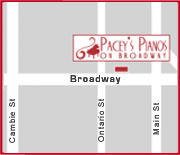Piano Repair
Comprehensive Repairs
Pacey’s Pianos offers comprehensive piano maintenance, service, and repair options. Our highly trained technicians come from around the world, and have worked at some of the most prestigious factories.
Standard Tuning
Tiny adjustments in the tension of the strings to properly align the intervals between notes, ensuring that the C# doesn’t sound like D
Regulation
Return your piano to its once perfect working order, restoring the touch and sound to optimal consistency across all of the notes. It may involve adjusting a screw to replacing a pin, or sanding wooden surfaces.
Let-off
When the hammer disengages the jack. Essential to achieving pianissimo and to play powerful compositions.
Drop
The distance the hammers move after let-off.
Repetition Springs
For grand pianos, it controls how quickly the hammer returns to its original position, stopping double strikes and allowing for rapid controls.
Key Weight
The resistance found in each key when engaged.
Pitch Raise
If a piano has not been tuned in a long time – a year or more – it is often necessary to perform a pitch raise. All of the strings have to be retensioned which puts a great deal of stress on the frame of the piano. Once the strings have been brought to their proper tension levels, then the actual tuning can take place. In order to avoid having to perform a pitch raise, be sure to tune your piano, at the very least, once a year. Ideally you should have you piano tuned every 6 months.
Voicing
Return your piano’s hammers to equilibrium. As the hammers strike the strings, they compress and eventually groove. A technician can service the hammers by using a voicing need to fluff the heads to achieve uniformity across the tones. Hammers can be filed or replaced when they are damaged.
String Replacement
As the name implies, strings are replaced when they become too old or corroded. Bass strings are particularly susceptible to wear and become thuddy from age. If a string breaks, it must be replaced before using the piano again, because hammers hitting broken strings will cause significant damage.
Sticky Keys
Usually caused by humidity changes, need of regulation, or simply spilled juice. They are usually quite easy to fix, and will allow you to play your piano again with fluidity… and all of the notes.
Caster Wheels
Piano wheels are typically metal and do not roll very well, especially after several years in position. These will damage floors and are generally hard to move. Caster Wheels make it convenient to move a piano to clean around it, for parties, or for renovations.
(c) 2024 Pacey's Pianos. All rights reserved.

